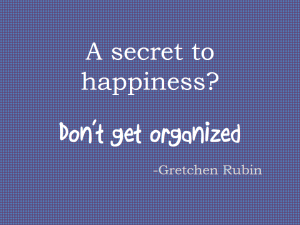 Gretchen Rubin, author of the New York Times best-sellers Happier at Home and The Happiness Project proclaims that one of the secrets to happiness is:
Gretchen Rubin, author of the New York Times best-sellers Happier at Home and The Happiness Project proclaims that one of the secrets to happiness is:
It’s Spring, and that’s the time of year that many of us turn to clearing out the clutter, both at home and at work. Somehow it’s tolerable in the winter months when we’re hunkered down, but something about the warmer weather makes us want to strip down and create some room to breathe.
But for people who have the “clutter mentality” (another of Gretchen Rubin’s phrases), Spring cleaning means simply organizing, without tackling the first the crucial step – eliminating. Rather than evaluating what’s important to keep and what no longer serves, those with a clutter mentality will organize and simply make things neat, without making the hard choices.
Fancy organizing tools – including technology tools – can be fun to use, but don’t let them become a crutch that you use to avoid making difficult decisions. Keeping things – or information – that you “might” need “someday” can be more of a distraction than it’s worth, especially if you can’t actually find it when you need it.
Real organization – and Spring cleaning – starts with clearing out – getting rid of anything and everything that is outdated or no longer useful. As Gretchen says, “If you don’t keep it, you don’t have to organize it.” Clutter prevents you from working efficiently by distracting you, covering up important documents or files, and by adding to anxiety and stress.
Getting rid of “stuff”
Clear away the physical clutter in your office. Most lawyers’ offices, whether those offices are inside or outside of the home, are clutter magnets, in part because they simply have too much to do during the day. But a periodic sweep through the office, keeping these five things in mind, should do the trick:
- Your office should only contain paperwork that you’re currently working on, supplies and files that you need on a regular basis, and a few mementos that are meaningful. The rest is trash or should find another home.
- Keep only those items in your office that you need to take action on or that you need to refer to when doing your work – but if the item is for reference on a project you won’t be working on in the next day or two, file it to keep the clutter out of your office – and to prevent distractions from the task at hand.
- If you haven’t done so already, now might be a good time to consider going “paper-less.” Instead of worrying that everything might not have made it to the paper file, or playing file tag with others in the office who need access to the same documents, scan everything that comes in and file it right away into the matter’s electronic file. But even if you work with paper files, don’t use your office as a place to store them. Your office should contain on the files you’re actually working on.
- Create an automatic deadline for tossing certain items, like bar association publications or section newsletters. Often, they are available online and they’ll be easier to find (and read) that way than by wading through a stack of periodicals to find the article you think you remember seeing.
- Get control of the mail and email. When mail arrives, categorize it immediately, and make a place in your office for each category. If it’s mail that has a particular date, make sure the date gets entered into your calendar immediately. Outdated emails or emails that aren’t client-related should be deleted. There’s no need to keep thousands of emails in your inbox.
Eliminating Other Obstacles to your Practice
Clutter isn’t just piles of “stuff” or paper. Clutter comes in all shapes and sizes. It includes the nagging worries cluttering up your thoughts, the “dog” files that you never get around to working on (or that you know will end badly), employees (or partners) who are abusive, nasty, unproductive, or otherwise drag your firm down, clients who don’t listen to your advice or are impossible to please, and more. De-cluttering isn’t limited to physical things or piles of paper in your office. Put a real “spring” in your step by adding these to your “toss” pile:
Bad clients
Do you need another reminder? Bad clients drive out good clients. They drain you of energy and distract you from doing your best work for your best clients. Consider firing some of your worst clients (or letting your staff tell you which clients they think you should fire).
Bad or unecessary employees
If you have motivated employees that contribute to your firm and help make you successful, by all means, keep them – and take good care of them. But some employees are toxic and drag down the rest of the firm. If you have employees that are abusive to staff, or clients, don’t pull their weight or are otherwise dragging you down, it may be time to bite the bullet and get rid of them.
Tasks and Procedures
Are you performing tasks you don’t need to do? Delegate more. Are some tasks being performed by multiple people, multiple times? Streamline your tasks so that the fewest possible people are involved in any particular task. When is the last time you reviewed your office procedures? Have some of your old procedures become redundant?
To-do list items
While I’m all for using lists, they need to be productive for you. A to-do list that contains too many tasks is overwhelming and unproductive. Make a “don’t do” list to help you drop unnecessary or unimportant items off of your to-do list. If you’ve been carrying a particular item on your list for a long time, reconsider whether that item is a priority for you. Instead of piling things onto your to-do list, schedule specific times to accomplish them and put them on your calendar.
Outdated services or practice areas
Re-visit your services: are there some services that have become outdated? Are you out of date or in need of a refresher course in your area of practice? Are there new areas of practice emerging that you would like to focus on? Are your clients’ needs being met with your existing services?
Keeping Up
Now that you’ve cleared out, I give you permission to organize what’s left. But don’t forget to do a periodic purge. Before you leave the office at the end of the week, take 15 minutes to do a quick pick up of your office – move out files or paperwork that doesn’t belong, get rid of any unnecessary mail or junk flyers, etc. Take a few minutes to review your calendar and tasks for the following week, and make a plan.




1 thought on “Don’t Organize – Spring Clean!”
Comments are closed.